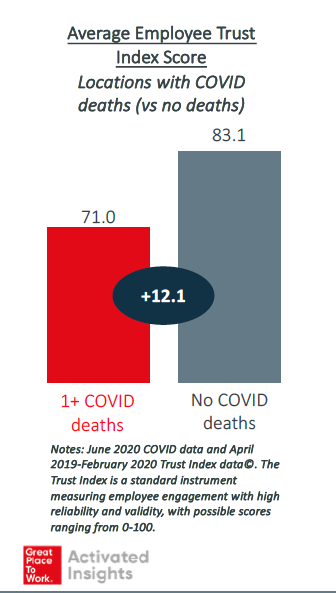
As the pandemic swept through northern California, an employee in a post-acute care center was struggling with unrelated family issues.
She was caught between her responsibilities caring for her family and her commitment to her team: calling out would have exacerbated already-tight staffing in her facility. Instead, her co-workers banded together quickly to raise funds and give her the support needed at home so that she could come to work. As a result, she could care for her elderly patients without distraction — and her facility has stayed COVID-free.
While great culture does not inoculate an organization from disasters like getting an active COVID case, trust in leadership and the workplace translate into quicker and more effective responses, according to a July 2020 study by Activated Insights that looked at 140 post-acute and long-term care settings, comparing the number of COVID-related deaths and each workplace location’s Trust Index™ score.


In particular, as seen in the inserted chart, we find a high Trust Index score in the workplace correlates to lower COVID deaths across the post-acute healthcare locations studied. The Trust Index is a standard instrument from Great Place to Work Institute scoring workplaces on a 0 to 100 scale. Prior Harvard Business School, Columbia, and Wharton research has linked the Trust Index to higher organizational performance.
Grappling with often confusing COVID direction from governmental authorities, companies across industries have taken leadership roles in the fight against COVID-19. In other words, when confronting an unexpected crisis such as a global pandemic, leadership matters more than ever. What this data suggests is the kind of leader who creates high trust workplaces enables staff to respond more effectively, and our evidence further suggests that these actions may save lives.
The study also finds:
- Locations with greater trust and transparency by leaders create workplaces where employees seem to more effectively combat the spread of an active case. The 121 communities out of 140 post-acute healthcare facilities with NO Coronavirus deaths scored 4-12 points higher on a 0-100 possible Trust Index score than locations with one or more deaths (with P<0.01 on both the Mann-Whitney U-Test and T-Test with unequal variances).
- In a separate analysis, looking at each organization’s score individually, the study suggests that every 2-4 point increase in Trust in management decreases the likelihood of 1 COVID employee or patient death at a particular location. The 140 locations are part of 4 organizations—two with locations in California, one with locations solely in New York, one with locations across southern Michigan, Indiana, Kentucky, and Ohio.
- These findings were consistent across three consecutive months of data, from May through July.
The findings make sense when we look at what is happening day to day on the frontlines. For instance, during a pandemic, teamwork, coordination and “pitching in” for each other are crucial to cover gaps and new needs. As one employee working in a high-trust Ohio site was quoted saying in this study: “More people from different departments have stepped up to help when needed because of all the extra requirements and health/COVID concerns.”
Looking forward, this pattern of leadership in companies is likely to be key to recovery. After the last recession, research suggested that companies with great cultures rebounded faster than others in their industry. We would argue — and hope to study — that after this COVID-19 pandemic, companies with strong leaders and great workplace cultures rebound more quickly as well.
Robert Kramer is founder and president of Nexus Insights, as well as founder and Strategic Advisor at NIC.
Jacquelyn Kung, DrPh, is a Nexus Insights advisor, as well as the CEO of Activated Insights, the senior care group of Great Place to Work Institute. Previously, she managed a senior care health system outside D.C. and was the U.S. long-term care expert at McKinsey & Company. She received her doctorate in public health from Johns Hopkins and MBA and BA from Harvard.






